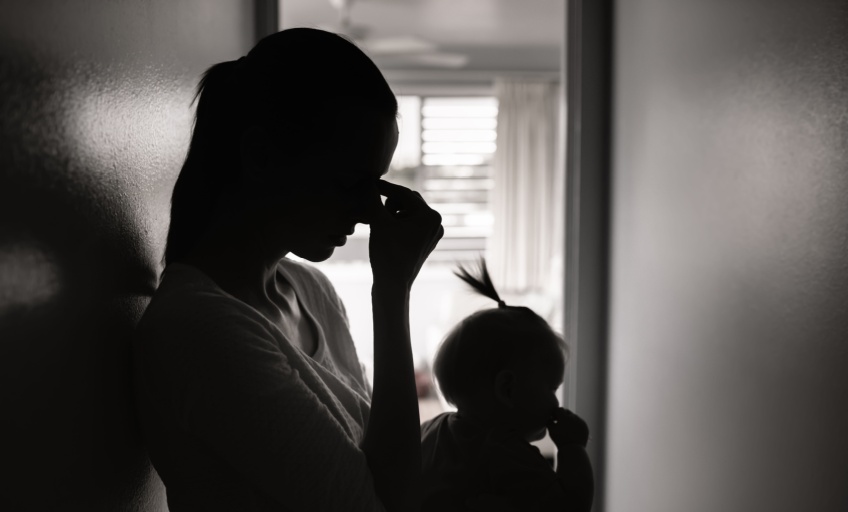Childbirth and motherhood is a journey through peaks and valleys. They are pivotal experiences in a woman’s life, marking profound physical, emotional, and psychological transitions.
इनके बारे में जानें:
- What is postpartum depression?
- Symptoms of postpartum depression
- Treatment options for postpartum depression
- When should you see a doctor?
What is postpartum depression?


The overwhelming experience of pregnancy and childbirth may cause sadness in new mothers. This can turn into depression, known as postpartum depression or depression after childbirth. Postpartum depression can be seen in nearly 1 in 7 women. It can also affect adoptive parents and surrogates. Postpartum depression is not at all uncommon, and mothers should not feel alone or guilty if they experience it. It’s a result of a wave of changes that a new mother experiences, and a healthcare professional should be able to help you see it through.
Symptoms of postpartum depression
Postpartum depression symptoms can vary between relatively mild and extremely severe. These symptoms can be physical, psychological or behavioral.
Emotional and mental signs
Mild emotional symptoms can be categorized as baby blues. It’s an unpleasant experience filled with anxiety, sadness and crying, but it usually goes away in 2 weeks without intervention. Severe postpartum depression can have other symptoms like:
- मूड में बदलाव
- Anger and irritability
- Difficulty bonding with the baby
- Feeling of hopelessness
- Thoughts of self-harm or harming the baby
- गंभीर panic attacks
- Restlessness
- Fear of inadequacy as a mother
Physical symptoms
Physical manifestations of postpartum depression are:
- Excessive crying
- Poor appetite
- Difficulty sleeping
- थकान
- के कारण होने वाली थकान
Behavioral changes
Severe impact on the body and mind leads to changes in the behavioral patterns of women.
- They often withdraw themselves from family and friends
- Mothers find it difficult to concentrate
- There is a lack of conviction in decision-making
- Lack of interest or pleasure in activities they previously enjoyed
Without postpartum depression treatments, these symptoms can last for months or longer.
Treatment options for postpartum depression
Postpartum depression treatments do not only include a professional’s intervention but also discipline and self-care at home. Mothers have to educate themselves on emotional and physical well-being. They must learn to manage stress, develop strategies for coping with the symptoms and build support networks. Most importantly, they must learn to understand their mind and body- what impact a stressor has on their body and how to deal with it. The main areas of concern are lifestyle and therapy:
Healthy lifestyle changes and self-care
A healthy lifestyle is critical to a healthy mind. New mothers must strive to get adequate sleep and rest throughout the day. Caring for the baby does not mean ignoring your well-being or skipping meals. Eating healthy and on time is non-negotiable. Don’t burden yourself with responsibilities, and make time for self-care. Your focus should be your and your child’s health and well-being.
Therapy and counseling


See a mental health professional and seek therapy for your condition. You may be suggested interpersonal therapy or cognitive behavior therapy to deal with anxiety and depression. Doctors can prescribe medicines to deal with postpartum depression symptoms without harming your child. Additionally, talk to people who are undergoing therapy or have successfully recovered. Others’ experiences can help you deal with your condition more effectively.
When should you see a doctor?
If you’re feeling paranoid, hallucinating or having delusions, and you find yourself lost or obsessing about the baby, you may have postpartum psychosis. It’s a severe form of postpartum depression and must be dealt with through immediate medical intervention.
You should speak to your doctor as soon as you experience baby blues or depression symptoms after childbirth. This will help you stay ahead of your illness. If you haven’t consulted a doctor, monitor your symptoms and note if there are any changes. Seeing a healthcare professional is wise if the symptoms grow stronger or last for more than two weeks.
Stay tuned to the Activ Living Community. Keep up to date with the latest health tips and trends through expert videos, podcasts, articles, and much more on पोषण, फिटनेस, सचेतन, और लाइफस्टाइल से जुड़ी बीमारियां like Asthma, Blood Pressure, Cholesterol, and Diabetes. Activ Living ke saath sahi sehat ki shuruaat ABHIkaro.
You may also be interested in the following blogs:
- डिलीवरी के बाद, फिटनेस सुधारने के लिए व्यायाम
- Postpartum Power Up: Essential Tips For Healing And Recovery
Popular Searches
How to lower blood pressure | Fruits good for liver | Unhealthy foods | रागी के लाभ | बेसल मेटाबोलिक रेट | हाई ब्लड प्रेशर के लिए एक्यूप्रेशर पॉइंट्स | Ayurvedic medicine for blood pressure | How to control cholesterol at home | Homeopathy for Asthma | Biological Age | Home remedies for TB | Natural beta blockers | Negative effects of internet | Types of walking | ब्लड प्रेशर कैलकुलेटर | ब्लड शुगर कैलकुलेटर | BMI कैलकुलेटर





















